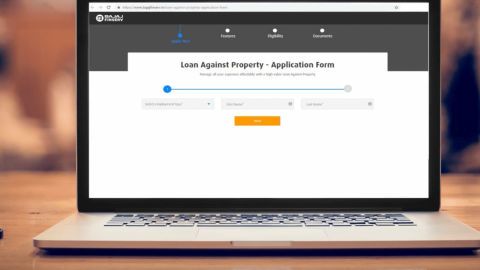Loan Against Property for Debt Consolidation
The Bajaj Finserv Loan Against Property offers applicants a high-value amount free from end-use restrictions. Avail of a sizeable sanction to pay off your existing obligations and consolidate your debt to one repayment source.
Debt Consolidation Loan: Features and Benefits
-
Doorstep facility
Apply for a loan against property without visiting a branch. Our representative will collect the paperwork from your home.
-
Flexible tenor
Repay the loan conveniently over a period ranging from 15 years if you’re salaried, and 15 years if you’re self-employed.
-
Flexi advantage
Borrow from the sanction as per your needs and pay interest only on what you withdraw. Also, pay interest as EMIs for the first few years.
-
Quick refinancing
Use our transfer facility to refinance your existing loan with Bajaj Finserv. Get a top-up loan for additional needs.
Debt Consolidation Loan against Property
Salaried professionals can get up to Rs. 1 crore and self-employed individuals can get of Rs. 5 Cr* and higher with the Bajaj Finserv Debt Consolidation Loan. Meet simple eligibility criteria, gather basic documents and apply online to get funds within 72 hours*.
Low interest rates and a long tenor make repayment easy and hassle-free, and you can use our Loan Against Property EMI Calculator to plan repayment in greater detail.
Debt Consolidation Loan: Eligibility Criteria
Our eligibility criteria for a loan against property are simple, so you can get started with the application process right away.
For salaried borrowers
-
Nationality
Resident of India, owning property in the following locations:
Delhi & NCR, Mumbai & MMR, Chennai, Hyderabad, Bangalore, Pune, Ahmedabad
-
Age
You must be between 25 years (18 years for non-financial property owners) to 85 years* (including non-financial property owners)
* 85 years* of age or less at the time of loan maturity -
Employment
Salaried employee of any private, public or multinational organization
For self-employed borrowers
-
Nationality
Resident of India, owning property in the following locations:
Bangalore, Indore, Nagpur, Vijayawada, Pune, Chennai, Madurai, Surat, Delhi & NCR, Lucknow, Hyderabad, Cochin, Mumbai, Jaipur, Ahmedabad
-
Age
You must be between 25 years (18 years for non-financial property owners) to 85 years* (including non-financial property owners)
* 85 years* of age or less at the time of loan maturity -
Employment
Self-employed individual with a consistent income from business
Debt Consolidation Loan: Fees And Charges
Once you know what is debt consolidation, apply for a Bajaj Finserv loan. We levy minimal loan against property interest rates and fees, and this makes us one of the best options in the market.
For salaried borrowers
Opt for debt consolidation with our affordable Loan Against Property interest rates. When you apply with us, you are assured of minimal processing and administrative charges and no part-prepayment and foreclosure charges, if all borrowers and co-borrowers are individuals, loan availed on floating interest rates, and loan taken for purposes other than business use, then there will be no foreclosure/ part-prepayment charges.
Debt Consolidation Loan: How to Apply
Apply for a debt consolidation loan in three, easy steps.
- 1 Fill a basic online form to start the process
- 2 Provide your personal and property details
- 3 Share income details for the best offer
Once you submit these details, our relationship associate will contact you and guide you with the rest of the steps in the application process.
*Conditions Apply
Debt Consolidation Loan Against Property FAQs
Debt consolidation is a process where a borrower takes a sizeable loan to clear multiple small debts. It is a common practice to clear short-term, high-interest debts, such as multiple credit card bills and consumer debts. Debt consolidation has several advantages, the key one being that multiple lines of credit attract higher interest.
When you consolidate your credit, you also have the option to choose from either secured or unsecured loan. In the case of a Loan Against Property, you have a secured loan that guarantees a relatively high-value loan amount and a long tenor. For those whose debts amount to relatively smaller sums, a personal loan is the better option.
There are several advantages of doing debt consolidation to clear your existing loans. Multiple lines of credit are likely to draw more interest, as each will be charged individually. On the other hand, loan against property debt consolidation loans charge an affordable rate of interest, which helps keep the total payable amount within a reasonable limit.
Moreover, you will also have the chance to choose from unsecured and secured loans for consolidation. Advances such as loan against property for debt consolidation can be used to clear larger debts. These credits disburse a substantial amount of money as the borrower mortgages his or her property to avail the funds. The loan repayment tenure is also considerably longer in this case.
In case your existing debts are lesser in value, you can easily apply for a personal loan for debt consolidation against basic loan against property eligibility and simple documentation requirements.
Financial institutions prefer applicants with a CIBIL score of 750 or higher to disburse credits. Individuals with a score lower than that might have a higher chance of facing rejections or may have to pay a higher rate of interest.
Moreover, a mortgage loan comes with an affordable interest rate, keeping the payable amount reasonable. The longer repayment tenor also helps ensure comfortable repayment without straining one’s finances.
A Loan Against Property is a secured financial instrument where your property serves as the collateral.
Individuals with a bad credit score can also avail of this loan since the collateral reduces the risk for the lender. Another point worth noting is that availing of a Loan Against Property with a bad credit score also provides one the opportunity to increase their CIBIL score. The repayment of the loan over the extended tenor gives you’re a chance to improve your credit rating if you timely pay your EMIs.
Debt consolidation is the process of consolidating multiple lines of credits into one. Utilise your savings to pay off your existing debts, or avail of a purpose-made line of credit to secure the funds. While the better option between the two is to clear your debts with your savings, it may not always be feasible. If you already have several financial liabilities and low repayment capability, it is a better idea to opt for credit instead of straining your personal finances.
A debt consolidation loan is a financial product that a borrower can avail of to repay all existing loans. You can consolidate all your monthly obligations and repay them using the funds secured through this form of credit. It makes repayment simpler as you will pay interest only on a single loan. Also, you will not have to keep track of multiple repayment schedules, thereby minimizing the chances of accidental delays in payment. It will also amortise your debt for a longer time span, ultimately making repayment more convenient.
Several financial institutions offer loans for debt consolidation. These include both government-backed and non-banking financial companies. You can avail of both unsecured credit, such as in the case of a personal loan, and secured credit, such as in the case of a Loan Against Property for debt consolidation, depending on your financial requirement, repayment capability, and preferred loan tenor.
There are multiple means of debt consolidation. One can avail of a purpose-built credit to pay off the loan or avail of end-use restriction free advances. Explained below are some of the most popular methods of debt consolidation in India.
Personal Loans
Personal loans offer unsecured credit with no end-usage restriction, making them ideal as debt consolidation loans. Most financial institutions offer a large sum, up to Rs. 25 Lakh, as a personal loan, providing adequate funds for a borrower to repay multiple small lines of credits. Moreover, personal loan interest rate is relatively lower than other short-term advances, making it an affordable option. Loans Against Property Secured loans such as a Loan Against Property for debt consolidation are preferred when the total due amount is substantial. Unlike personal loans, lenders disburse these credits against a mortgaged property, which lowers the associated risk. Lenders charge an even lower rate of interest on these loans compared to unsecured credits and allow a longer repayment tenor as well.
A Loan Against Property also comes without any end-usage restriction, making it ideal for debt consolidation. It is better suited to consolidate multiple larger loans, including unsecured credits, because of its substantial amount of disbursed funds.
These are the two primary types of debt consolidation used in India. Both are ideal for specific situations; unsecured credits can be utilised to clear multiple credit card dues, utility, or other types of smaller dues, whereas a Loan Against Property can be used to clear larger debts.
Debt consolidation works by opening a new line of credit that offers adequate funds to repay multiple existing liabilities, allowing you to repay the collective sum through one monthly instalment. It is one of the most common methods used to pay off multiple existing debts, since short-term debts such as credit cards attract high interest rates and your dues can accumulate into a significant amount.
If you own multiple credit cards with a substantial outstanding on several, avail of a debt consolidation loan to repay to a single line of credit at a lower rate of interest. What’s more, these loans allow you the option to pick a long repayment tenor, which ensures comfortable repayment without straining your finances.
Several financial institutions offer debt consolidation loans, including both public and private financial companies, in the form of secured and unsecured credit. Unsecured credit, such as a personal loan, can be used to consolidate debt as well. It is the preferred of option for debt consolidation when the quantum of funding needed is relatively low.
Applicants need to submit the below documents when looking to apply for a Loan Against Property.
Identity Proof – Submit a valid Government-issued identity proof while applying. KYC documents such as Aadhaar, Voter ID, PAN card, and driving license are accepted as identity proof.Address Proof – To prove your residency, you will have to submit an address proof along with other documents while applying for a loan for debt consolidation. You can submit your Aadhaar, passport, post-paid phone bills, and electricity bills as address proof.Income Proof – Lenders ask for copies of salary slips as well as bank account statements for the past 3 to 6 months to evaluate your income, obligations, and repayment capability.Employment Proof – Lenders also ask for a copy of one’s employee ID card or other proof of employment during verification.Property Documents – Lastly, if you apply for a Loan Against Property for debt consolidation, you will also have to submit ownership documents for the property you wish to mortgage.








